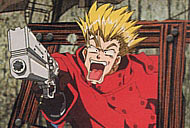
Trigun
Every company likes an evergreen property. It's one thing to milk a popular cash cow for a few years while the public digs it, but it's another thing entirely to find a show that continues to find an audience well after it went off the air. There are classic programs that occasionally resurface, things like the early Lupin III episodes and Galaxy Express 999, but they are rare.
One program that keeps coming back, now 15 years after its debut, is Trigun. Not wildly popular in Japan, Trigun landed in the US at the perfect time, buoyed by the success of vaguely similar action-comedy genre-mate Cowboy Bebop. It's been so successful that over a decade past its conclusion, a film version has found its way to our shores, made primarily because of Western fan support. Unlike a host of shows released in the late '90s, finding it is simply a matter of having a subscription to Hulu or Netflix. But is it still worth your time? After all, many series of that era have disappeared and with good reason. My take is that Trigun is definitely a lot of fun, even though it isn't quite as good as its sterling reputation. (And if you'd like to see my original take on the first DVD, you can find it here.)
As the show begins, two insurance agents -- Meryl and Milly -- are trying to track down the notorious Vash the Stampede. With a $$60,000,000,000 price on his head and a tail of destruction in his wake, it's no wonder they've been assigned to stop the madness. The problem is, Vash might be the most dangerous person alive, but he's also goofy to the point of idiocy. Could this silly guy who can dodge almost anything and hit any target (without killing anyone) be the cause of so much carnage? Indeed he can. As the series progresses, we go from seeing Vash as a blunderer who gets through trial after trial by dumb luck to realizing that he's a lot more than the imbecile he appears. Reluctantly, Meryl and Milly become Vash's entourage only to find that he's the genuine article. He may be a lunatic, but he's also the only thing that stands between their desert planet and a malevolent force that could destroy it.
Trigun's animation holds up reasonably well for a TV show as old as it is, though time has passed its style behind. In many ways, I still prefer the look of this kind of programming, so it didn't bother me. The animation does falter near the end, probably the result of budgetary constraints, but it works for the context. While there has yet to be an HD cleanup of the show, the versions found through the major services look just fine. The dub is decent; there's a fair amount of additional swearing to cover lip flap, which isn't my preference. Other than a random awful reading here and there, though, it's perfectly fine for this kind of show.
I admit that it took me a while to return to Trigun. I'd watched the opening episodes several times, as I did with other shows like Evangelion. Yet it never compelled me to watch more. Those first couple hours were fun, but there's little there to make you hope the show will be anything more than a friendly distraction. However, continuing plots begin with episode 5, and the addition of gun-toting priest Nicholas Wolfwood in episode 9 is welcomed. Frankly, once Wolfwood appears, the show really begins. The plot, once it gets going, is no slouch and explains a lot of lingering questions from the opening of the program. The evil gang that hunts Vash and his friends in the second half is downright creepy. As Vash's past is revealed and the magnitude of what's going on becomes apparent, there's a constant drive to find out what's going to happen next.
Unfortunately, the show has a major failing, and that's a lack of confidence in where it's going and what it's trying to be. Is it action? Is it comedy? Is it drama? Is it tragedy? Well, yes, and there's the rub. The show Trigun starts out being is not the show it eventually becomes. I can't think of another series that begins so laugh-a-minute that turns so dark by the end. (Even FullMetal Alchemist with its mood swings doesn't go quite this far.) It feels schizophrenic. You might start loving the series only to hate the ending; those who find the beginning too silly might enjoy where it goes. If the director and crew had been more assured in where they were going, there would have been a lot less disjointedness by the end. (To be fair, it's possible this was a problem in the original manga; I don't know.)
What saves Trigun from its ADHD direction is its characters. Likeable to a fault, every main player is enjoyable, even in their worst moments. Once again, I have to mention Wolfwood's entry into the series because he brings out the hidden traits lying dormant in Vash and Milly and Meryl. I don't mind saying that he's more compelling on several levels than Vash himself. But all of them have their moments to shine. And honestly, while I didn't care for the stories with dumb guys pressing their luck with Vash because they were 10 feet tall and had muscles the size of the Chrysler building, the brotherhood of evil that tries to destroy Vash in the second half has some really memorable villains.
There's a certain "kitchen sink" approach to Trigun that makes it overpacked and sometimes even repetitive. Yet there's an awful lot to like here, especially for action fans who like both comedy and pathos over the course of ten hours. With a surprising number of memorable moments and personalities, Trigun has held its own for a long time on the strength of its overall package. It's not quite top tier, but it comes darn close.
Trigun -- violence, profanity, extremely brief (male) nudity -- A-

